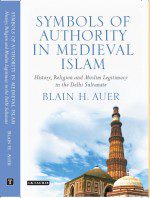Religion, Historiography, and the Emergence of Islamic Empire in India
 Blain H. Auer, Assistant Professor of Islamic Studies, Department of Comparative Religion, Western Michigan University
Blain H. Auer, Assistant Professor of Islamic Studies, Department of Comparative Religion, Western Michigan University
Chair: Ali Asani, Professor of Indo-Muslim and Islamic Religion and Cultures, Harvard University Study of Religion
Amidst dramatic political and social changes, Delhi and its sultans stood in a new, elevated relationship of power to the Muslim world. In this context, Blain Auer, Assistant Professor of Islamic Studies, Department of Comparative Religion, Western Michigan University draws attention to the multiple ways Muslim historians, who functioned under state patronage, narrated the religious values of Islamic courts and their sovereigns through the creative process of history writing. Historians demonstrated their sultans’ affinity, equality and superiority to the exemplary religious figures of Islamic history: the pre-Islamic prophets, Muhammad, the early caliphs and Sufi shaykhs. While aligning the history of the sultans of Delhi with an idealized and universal history of Islam, the Delhi Sultanate was projected as an Islamic empire with the mandate of divine guidance. This work makes a significant contribution to understanding Islamic ideals of religious and political authority at the foundation of Islamic empires. It is essential reading for those with an interest in religion, history, Islamic studies and South Asia.
Co-sponsored with the Prince Alwaleed Bin Talal Islamic Studies Program
Watch the video footage:
Religion, Historiography, and the Emergence of Islamic Empire in India from The South Asia Initiative on Vimeo
